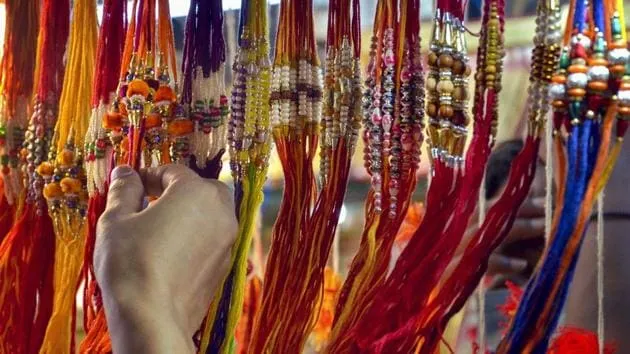Table of Contents
Introduction

In a poignant and symbolic gesture, the widows of Vrindavan have sent 551 rakhis to the Prime Minister of India, encapsulating both their hopes and their call for recognition and support. This gesture comes from a community that has long lived in the shadows of Indian society but is now seeking to make its voice heard through a meaningful tradition.
The Tradition of Raksha Bandhan
Raksha Bandhan, a festival celebrated widely across India, traditionally symbolizes the bond between brothers and sisters. During this festival, sisters tie a rakhi, a sacred thread, around their brothers’ wrists, and in return, brothers pledge to protect them. This ritual, imbued with affection and duty, serves as a powerful reminder of familial bonds and protection. However, for the widows of Vrindavan, this festival has taken on a new dimension of significance, transforming from a personal celebration into a call for wider societal recognition and support.
Vrindavan Widows: Their Story
Vrindavan, a town steeped in religious and cultural significance, is also known for its widows who have sought refuge there, fleeing the hardships of their past lives. These women, often abandoned or ostracized, have found solace in Vrindavan’s temples and ashrams. However, despite their peaceful surroundings, they continue to face social and economic challenges.
Many of these widows have dedicated their lives to religious service, seeking spiritual solace and a sense of purpose. Yet, their contributions and struggles often go unnoticed. The act of sending rakhis to the Prime Minister is a powerful statement of their desire to be recognized and supported by the highest levels of government.
The Significance of Sending Rakhis to the Prime Minister
By sending 551 rakhis to the Prime Minister, the widows of Vrindavan are not merely participating in a traditional ritual; they are also highlighting their plight and aspirations. This gesture serves as an appeal for acknowledgment and assistance, symbolizing their collective wish for a better life and greater dignity.
The number 551 carries its own significance, representing both a substantial collective effort and a symbolic gesture. It signifies the unity and the shared voice of the widows, amplifying their message of hope and their call for action. The act of sending rakhis to the Prime Minister also underscores their belief in the power of tradition and their hope that this symbolic gesture will draw attention to their needs and concerns.
The Impact of the Gesture
The gesture of sending rakhis to the Prime Minister has the potential to raise awareness about the challenges faced by the widows of Vrindavan. It can act as a catalyst for increased support and interventions from both the government and the public. By bringing their plight to the forefront, the widows are not only seeking to improve their own lives but also hoping to inspire broader societal changes that address issues of abandonment and neglect faced by many in their community.
This initiative highlights the need for comprehensive policies and programs that support widows, addressing their social, economic, and emotional needs. It is a call for a more inclusive approach to welfare, ensuring that all members of society, regardless of their past, are given the opportunity to live with dignity and respect.
Responses and Reactions
The response to this gesture from various quarters has been mixed. While it has garnered sympathy and support from some, others have called for more tangible actions to address the issues faced by the widows. The Prime Minister’s office has acknowledged the gesture, and there is hope that it will prompt a review of policies and programs aimed at supporting vulnerable populations.
Moving Forward
The act of sending rakhis to the Prime Minister is a powerful reminder of the need for ongoing attention and action towards the welfare of marginalized communities. It underscores the importance of listening to the voices of those who are often overlooked and ensuring that their needs are met with compassion and efficiency.
As the nation reflects on this gesture, it is an opportunity to renew commitments to social justice and support for those in need. The widows of Vrindavan, through their symbolic act, have opened a dialogue about their lives and their hopes, and it is now up to society to respond with meaningful action and support.
Conclusion
The act of sending 551 rakhis to the Prime Minister by the widows of Vrindavan is a poignant symbol of hope and a call for recognition. It represents a collective plea for support and acknowledgment, reflecting their aspirations for a life of dignity and respect. This gesture not only highlights the challenges faced by the widows but also serves as a powerful reminder of the need for comprehensive and compassionate responses to the needs of marginalized communities.
As the nation engages with this gesture, it is crucial to approach it with empathy and a commitment to addressing the underlying issues faced by the widows. Through collective efforts and meaningful policies, we can ensure that the hopes expressed through this act are realized and that the widows of Vrindavan, and others like them, are given the support and recognition they deserve.







